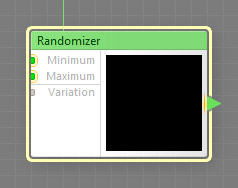
The Randomizer slave component of Patterns Plus (Bricks Plus, Pavements Plus and Tiles Plus) components outputs a normalized random value (converted to color) that is unique for each pattern element (tile, brick or pavement block). You can use multiple copies of Randomizer with different Variation settings (random seeds). This component can output HDR colors.
In order to affect individual elements, this slave component must be connected to the subtree of its master's slave-accepting input (Bricks, Pavements, or Tiles), and such connection must not be routed through any bitmap-based components.
For general information about slave components, see Slave components.
Minimum and Maximum: Map Input (HDR)
These inputs define the color range of the Randomizer output. Technically, they are used for converting the normalized internal per-element random number into a color by using this number as a percentage of interpolation between Minimum and Maximum colors. These inputs can accept HDR colors.
Technically known as random seed, this input provides a starting value for the internal random number generator. Two copies of Randomizer with identical Variation setting will produce the same internal random numbers per each pattern element, though their output color may be different if their Minimum and/or Maximum colors are different. The per-element random numbers are also affected by the global Variation value. For more information, see How Variation Works.
Preview:
This control allows you to preview output values of the slave component, which may be useful for creating and debugging the subtree of the slave-accepting input. Technically, Preview defines the output of the slave component in situations when it is sampled by any input other than its master's slave-accepting input.